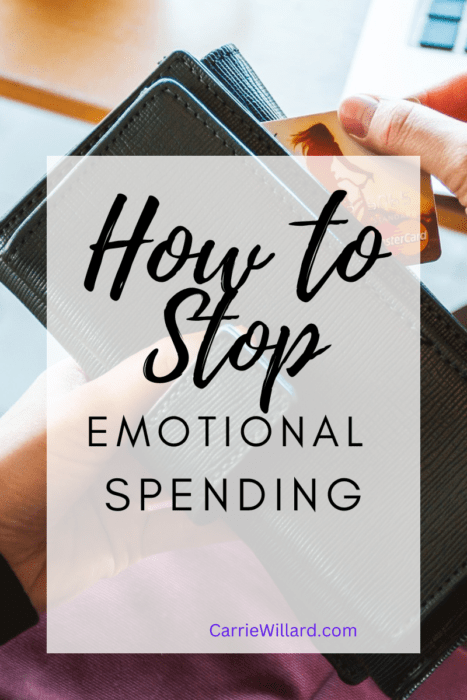I’ve avoided taking a close look at my spending recently, and this neglect has made me anxious.The stress of the last few months has made it impossible for me to focus on the details of my budget. In addition, I’m no longer doing a weekly or monthly budget meeting with my spouse. So when I sat down to review last month’s spending in Mint, I realized I’d engaged in a lot of emotional spending.
What is emotional spending?

VeryWell.com defines it this way:
Emotional spending is spending money during a period of heightened emotions, like stress or sadness. It often results in buying items you don’t really need, or even want. Mental health experts say this is a coping mechanism to avoid addressing those difficult emotions…
For me, emotional spending happens when I am buying stuff in an attempt to feel better or prove my worth. Instead of dealing with the emotions in a healthy way or solving the actual problem in a constructive way, I spent money.
Here are some examples of emotional spending in my life.
After I moved and bought a house, I had exhaustion for weeks and got out of the habit of working out at the gym. I felt unattractive, so I bought a bathroom scale (that I never use).
I overspent on my children because I felt guilt (inappropriate guilt post-divorce is very common).
I felt inadequate and ignorant due to my lack of education, so I spent money on a college course that had no real value in my life.
(Disclaimer: I am not a licensed mental health care professional. I’m sharing my own experience. Compulsive spending can be a symptom of a mental health disorder. I urge you to seek therapy if you’re experiencing this issue.)
How to stop emotional spending
Awareness. Now that I realize what I’ve been doing, I can make this behavior conscious rather than unconscious. I can ask, “What is the real problem here? What’s the emotion I’m trying to avoid?”
Analysis. I started checking my Mint account daily so I can be more aware of my spending. I can also analyze whether various purchases did “spark joy” because they were necessary or meaningful. Some expenditures do increase our happiness. For example, I took the kids apple picking last weekend and spent $90 to take home a half bushel of apples. Ha! But the experience and spending time together made that valuable. (See: All The Money in the World review for more about how money can make you happy.)
Asking yourself, “did this purchase make me happy?” can reveal your values. That’s crucial knowledge for financial planning.

Journaling. I’ve journaled off-and-on for many years, but recently have become diligent about it. Anytime I have strong emotions, I open the document in my Google Drive and type. Because I can access it on my phone, it’s convenient. I can squeeze it in anytime, such as while idling in the car rider pickup line after school.
Therapy. I told a friend recently that I would eat only one meal a day, beans and rice at that, before I’d give up therapy. I pay out of pocket to see my therapist, and it’s worth every penny.
I met a finance therapist at FinCon and immediately purchased her book, The Financial Anxiety Solution (Amazon affiliate link). While workbooks like this aren’t a substitute for therapy, they’re a great addition. It’s also a built-in journal. Having prompts are great if you’re new to journaling or struggle with it.

Have you found yourself spending money because you were avoid dealing with your emotions? What helped you to stop emotional spending?
p.s. Spending out of boredom isn’t a big issue for me, but if you struggle with that, you might enjoy: Things to do instead of shop
Leave a Reply